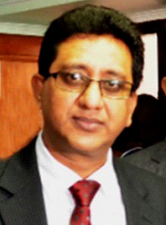Former Attorney General (AG) Anil Nandlall yesterday slammed government for what he termed an “exercise in cosmetology” in relation to consultations on two bills set to be debated in the National Assembly tomorrow.
“…the PPP’s firm position is that no `gaff session’ of any subject minister can be used as a substitute for the Special Select Committee mechanism of the National Assembly regarding Bills which require review and public consultations. It is nothing but an attempt to undermine parliamentary democracy under the thin guise of conveying the impression of public consultation,” Nandlall said in a press statement.
Nandlall on behalf of the PPP/C, had previously requested government to send the Coroners (Amendment) Bill 2015 and the Law Reform Commission Bill 2015 to a parliamentary Special Select Committee citing the need for further consultations on the legislation.

In his statement yesterday, he related that on December 31, 2015, he received an invitation to attend a consultation hosted by AG Basil Williams at the ministry on Monday in relation to the two bills. Nandlall said although there was no working date between the two dates, he attended on behalf of the PPP/C and reiterated the party’s position contained in two letters sent previously to Williams which urged that the bills be sent to a select committee.
“The Attorney General rejected our request. More importantly he indicated that the two bills were approved by Cabinet and no consultation can go beyond the scope of those Bills. I quickly realised that what we were engaged in was an exercise in cosmetology and not meaningful consultation,” he said.
Nandlall told Stabroek News that the meeting included reps of the Bar Association and Private Sector Commission. According to the attorney, Williams’ request to meet, which was sent via email was to “satisfy public perception of consultation.” He said while he was invited in a very informal matter, the presence of other attendees suggested that it was to be taken formally.
“He prepared to be unprepared. He was unprepared to entertain any meaningful and substantial changes to the two bills,” Nandlall charged. He said the AG was of the view that since Cabinet had approved the bills in their current form, consultation could go no further.
Nandlall told Stabroek News he found this ridiculous and he is of the belief that his original letters, dated December 29, 2015, were misinterpreted.
In sending an email, Nandlall said, the Attorney General “completely missed the point” and his original letters identified clearly the proper channels necessary for government and the opposition to discuss and hold consultations on the bills prior to them becoming law. In his statement, Nandlall had said “the Bills should be sent to a Special Select Committee to which important stakeholders should be invited to make a contribution.”
He also highlighted the PPP/C’s issues with the bills in their current form. He said the Coroners Bill does not address the real mischief of the Principal Act, and this can only be addressed in a comprehensive review of the bill.
“One of the main problems with the principal Act is that, because of its language, it induces an abdication of responsibility on the part of the Coroner in the different magisterial districts. This must be rectified to ensure that magistrates are mandated to conduct inquests in the areas in which they exercise jurisdiction. In this regard, special considerations must be given to the Georgetown Magisterial District which has several magistrates exercising jurisdiction over the same geographic area. In the end, the Bill must make it clear to each magistrate that they have a duty to carry out their responsibilities under the Principal Act,” he said.
The former AG also highlighted several other issues.
In relation to the Law Reform Commission Bill, Nandlall declared that the legislation should expressly state that the Law Reform Commission is an independent body and the appointment process as well as the composition of this body should reflect this independence.
“The Bill vests the authority to appoint in the President after consultation with the Minister of Legal Affairs. By this mechanism the Executive is consulting with itself. This is simply absurd,” Nandlall declared.
He noted that in the Bill, it is the Executive, without any extrinsic input, that determines who will be appointed to the Commission and recommended that a formula be used whereby the names of the persons who are to sit on the Commission come from important stakeholders in society. He outlined that there should be eight nominees from various sections of society inclusive of the Private Sector Commission, the labour movement, University of Guyana Council, the Chancellor of the Judiciary and a nominee from the major political opposition in parliament, among others.
The bills were up for debate last month but were put off as time ran out at the last sitting of the House. Nandlall previously told Stabroek News that “I believe these are technical pieces of legislation and public participation in them is vital. They are technical pieces of legislation in need of discussion.”
The Coroners bill seeks to cater for circumstances where magistrates are unable to conveniently or speedily serve as coroners. At present, the magistrate of a magisterial district where an unnatural death occurs serves as the coroner. The explanatory memorandum of the bill says that where the magistrate is unable to act, the nearest justice of the peace who is able to act will serve as the coroner.
According to the explanatory memorandum, the amendment provides for the Judicial Service Commission to appoint fit and proper persons to be coroners for the whole of Guyana.
The bill if passed will see the insertion in the Principal Act of section 3A which says in part that in the County of Demerara there shall be at least three coroners, two in the County of Berbice and at least one in the County of Essequibo.




